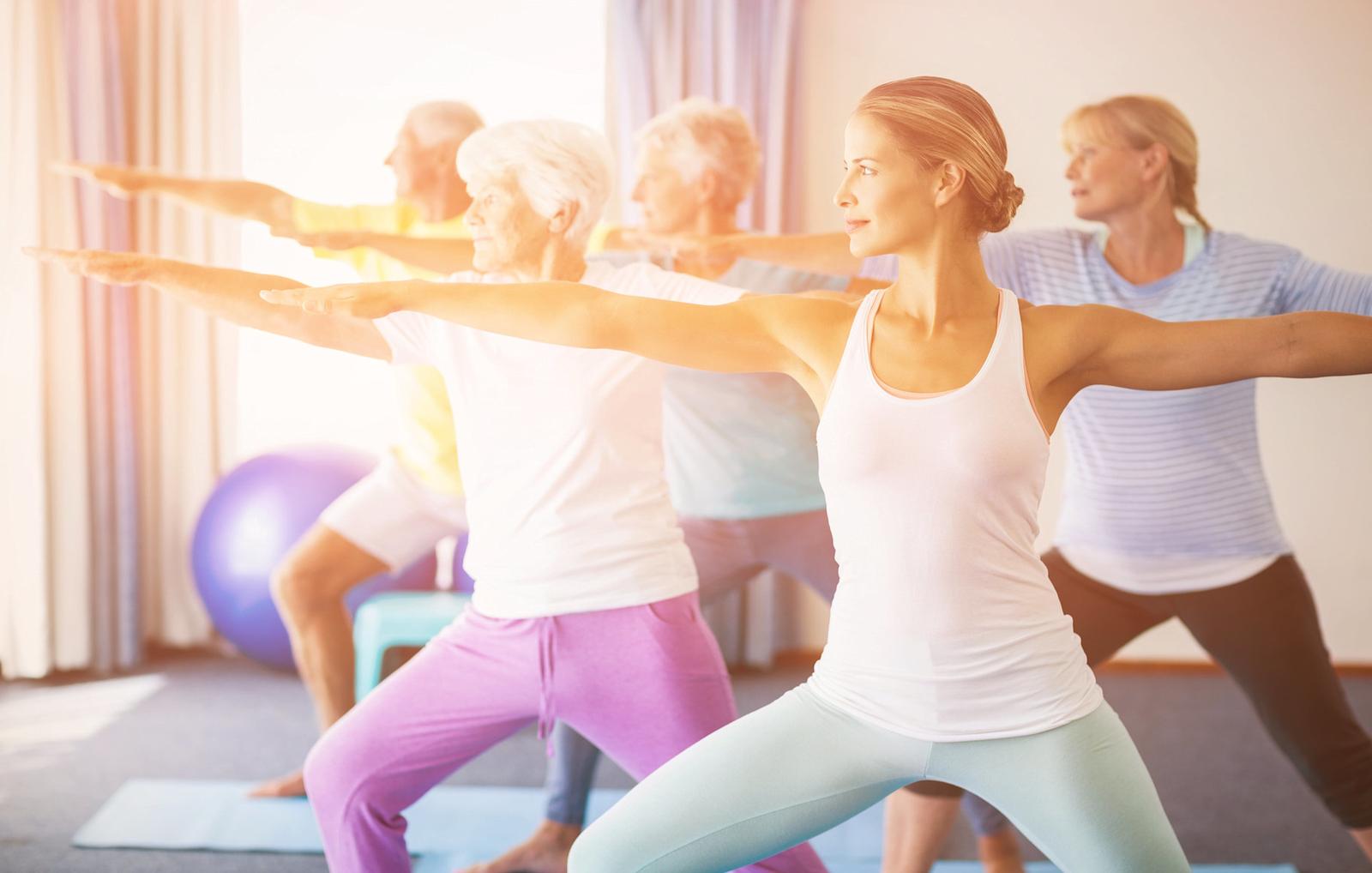
Was sind die langfristigen Vorteile von Bewegung?
Peer reviewed by Dr Colin Tidy, MRCGPLast updated by Lynn StephenLast updated 21 Sept 2025
Erfüllt die Anforderungen des Patienten redaktionelle Richtlinien
- HerunterladenHerunterladen
- Teilen Sie
- Sprache
- Diskussion
Regelmäßige Bewegung hilft uns, unsere Beweglichkeit, unser Gewichtsmanagement und unsere geistige Gesundheit zu verbessern - und die Auswirkungen sind fast sofort sichtbar. Regelmäßiger Sport trägt aber auch dazu bei, dass man im späteren Leben länger gesund bleibt.
In diesem Artikel:
It's no secret we are spending an increasing amount of time sitting down. As technology advances, our screen time increases. This time may be spent on our phones, looking at our work screens, or watching television. It's not surprising the average person is sitting down for 9 to 10 hours a day.
As we age, our bones become weaker as their density decreases. Our hearts have to work harder as our blood vessels stiffen, and our metabolisms slow down. This increases the likelihood of weight gain and certain health conditions.
Although there are few ways to avoid our work screens, it is likely you are able to counteract or delay these health issues, simply by staying active.
An American Cancer Society study found a link between long periods of leisure time sitting and a higher chance of death caused by heart disease, high blood pressure, high cholesterol, and type 2 diabetes. Making sure we get more activity into our lives - even light activity - could help us live for longer.
Lesen Sie unten weiter
Einfach umziehen
The majority of advice for staying active, especially if you are new to exercise, is to move more. This needn't be running marathons or attending every Zumba class you can find. It's as much about increasing your activity on a day-to-day basis simply by taking walks after dinner, squatting whilst brushing your teeth or just getting some extra steps in whilst you wait for the kettle to boil.
James Robinson, personal trainer of more than 10 years says that we should take any opportunity to strengthen our cardiovascular system.
"I see people parking as close to the gym entrance as possible, to walk on a treadmill for 30 minutes."
He explains that increasing your non-exercise tasks, such as taking the stairs instead of the escalator, parking further away from the entrance of the supermarket or taking short breaks to walk around your office, are great ways to incorporate more activity. These will help strengthen your cardiovascular system and reduce your chance of many health conditions further down the line.
James adds that through exercise, we learn about our bodies. He has, on occasion, found his clients have discovered a number of pre-existing conditions through exercising, including hypermobility and anaemia.
He says: "Exercising is a great way of understanding your body, its capabilities and its limits. By educating ourselves, we are hopefully able to address any issues and live longer, healthier lives. It is never too late to start and it's possible to improve your fitness by increasing your physical activity at any age."
Stärkung der Gelenke
In addition to increasing your day-to-day activity, including certain exercises in your workouts can strengthen the muscles that protect and support your joints.
This is especially important for those who have joint pain, stiffness and arthritis. Contrary to popular belief, avoiding exercise due to joint pain can actually lead to muscles becoming weaker, therefore causing more pain when moving joints. Arthritis Action advises it is vital to stay active or increase your level of activity to help reduce pain and improve joint movement.
Appropriate strength training - using weight to gradually build muscle - is particularly beneficial, and can range from body weight exercises to incorporating additional weights such as dumbbells and kettlebells.
Lesen Sie unten weiter
Psychologischer Nutzen
As beneficial as exercise is to your body in the long term, it can also be helpful to your mental health in a number of ways. Mental Health charity, Mind, reports there have been many studies, which show physical activity can improve mental health.
Some of the psychological benefits of exercise include:
Better mood - there are a number of feel-good chemicals your body releases when you exercise, improving your outlook and making you feel happier. Not only this, but it is likely you will feel more energised after your workout than you did before, setting you up well for a productive day.
Managing stress and anxiety - exercise doesn't just produce feel-good hormones, it can also help lower the levels of stress-related hormones in your body. Therefore, it goes without saying, less of these hormones should help alleviate feelings of stress and anxiety.
Better sleep - naturally, being happier and having lower levels of stress and anxiety should aid with your sleep quality. Most people should avoid strenuous workouts later on in the evening. However, yoga and stretching can help you relax and unwind for a better night's rest.
Trotz der vielen Belastungen, denen wir alle im Leben ausgesetzt sind, können einfache Änderungen des Lebensstils die unvermeidliche Zeit, die Sie im Sitzen verbringen werden, ausgleichen. Sie mögen anfangs nur geringe Vorteile bringen, aber Ihr Körper und Ihr Geist werden Ihnen für Ihre Zeit und Mühe danken, wenn Sie in der Lage sind, bis ins hohe Alter gesund und aktiv zu bleiben.
Patienten wählen aus für Bewegung und körperliche Aktivität

Gesundes Leben
Warum Sitzen unsere Gesundheit ruiniert - und wie 22 Minuten Bewegung helfen könnten
Für viele von uns besteht ein Arbeitstag darin, mehrere Stunden am Stück vor dem Computer zu sitzen - und das hat ernsthafte Auswirkungen auf unsere Gesundheit. Forschungsergebnisse deuten jedoch darauf hin, dass 22 Minuten mäßige bis kräftige Bewegung pro Tag die negativen Auswirkungen einer sitzenden Lebensweise auf die Gesundheit verringern können.
von Victoria Raw

Knochen, Gelenke und Muskeln
Die besten Übungen für Ihre Gelenke
Vielleicht haben Sie Bedenken, wie sich Bewegung auf Ihre Gelenke auswirkt, vor allem, wenn Sie bereits unter Gelenkschmerzen oder Steifheit leiden. Regelmäßige körperliche Betätigung kann jedoch hilfreich sein, um gesunde Gelenke zu schützen und in manchen Fällen sogar Gelenkschmerzen zu lindern. Entscheidend ist, dass man Übungen wählt, die die Gelenke nur wenig belasten, die Flexibilität verbessern und die Muskeln um die Gelenke herum aufbauen. Im Folgenden sprechen wir mit der Fitnessexpertin Laura Williams über die besten Übungen für Ihre Gelenke.
von Heather Ainsworth
Lesen Sie unten weiter
Artikel Geschichte
Die Informationen auf dieser Seite wurden von qualifizierten Klinikern geprüft.
Nächste Überprüfung fällig: 21 September 2028
21 Sept 2025 | Neueste Version
16 Februar 2020 | Ursprünglich veröffentlicht
Verfasst von:
Priya Patel

Fragen, teilen, verbinden.
Stöbern Sie in Diskussionen, stellen Sie Fragen, und tauschen Sie Erfahrungen zu Hunderten von Gesundheitsthemen aus.

Fühlen Sie sich unwohl?
Beurteilen Sie Ihre Symptome online und kostenlos
Melden Sie sich für den Patienten-Newsletter an
Ihre wöchentliche Dosis klarer, vertrauenswürdiger Gesundheitsratschläge – geschrieben, damit Sie sich informiert, sicher und unter Kontrolle fühlen.
Mit Ihrer Anmeldung akzeptieren Sie unsere Datenschutzerklärung. Sie können sich jederzeit abmelden. Wir verkaufen Ihre Daten niemals weiter.